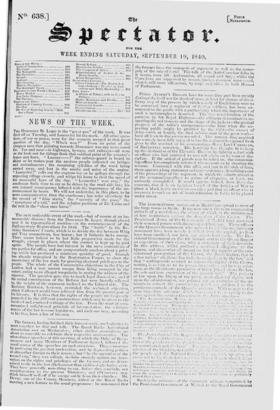The next noticeable event of the week—hut of' course at
an im- measurable distance from the Doncaster St. Leger, though placed next it in typographical position—is the commencement of the Parliamentary Registrations for 1840. The " battle" in the Re- vising Barristers' Courts, which is to decide the day between Whig and Tory competitors, has begun ; but it hitherto lacks energy. There seems indeed to be but little preparation made fbr the struggle, except in places where the contest is kept up by paid agents. The people have lost interest in the mere contentions of two parties fttr office, and are comparatively careless about a privi- lege which has produced a minimum quantity of good. Enough has already transpired in the Registration Courts to show the uncertainty of the law made for granting electoral privileges to the people. The whole of the Conservative objections in the City of London had it very narrow escape from being swamped in the outset, owing to an alleged irregularity in stating the address of the objector. The question gave rise to much legal discussion ; and it' the verbal construction of the Reform Act were literally adlt.red to, the weight of' the argnment inclined to the Liberal side. The Revising Barrister, however, overruled the technical objection, which if allowed would have relieved him from the greater part of his labours. It is thus that the rights of the people are frequently jeoparded by the ili!E•rent constructions which may be given to the involved awl contused verbiage of the law. From the Want of An I 11 to recognized enlightened principle of interprot:ition, the alininis- trators of the law besome legislators, and each one may, according to his bias, have it law of his own.


























